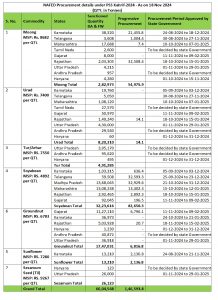The procurement of Kharif pulses and oilseeds under the Price Support Scheme (PSS) is facing significant delays, with progress falling far below expectations. As of November 18, 2024, the procurement figures remain disappointingly low, and several key states have not met their targets.
For Soybean, only 82.6 thousand tonnes have been procured out of the expected 3,223.6 thousand tonnes, highlighting shortfall in procurement. In major soybean-producing states like Maharashtra and Madhya Pradesh, procurement has been partial, and many farmers are still struggling to access the MSP of Rs 4,892 per 100 kg. While the average market price of soybean is currently between Rs 4,100 and Rs 4,200 per 100 kg well below the MSP, the government has been unable to procure the crop effectively.
The procurement of Groundnut is equally concerning. Of the 1,747 thousand tonnes approved for procurement, only 6.8 thousand tonnes have been collected. Gujarat, which had a target of 1,127 thousand tonnes, has procured just 6.8 thousand tonnes, while Rajasthan has reported a mere 20.6 tonnes out of its approved quantity of 503.9 thousand tonnes. Procurement in states like Haryana, Uttar Pradesh, and Andhra Pradesh has not even begun. Similarly, procurement for Sunflower and Sesame has been erratic and disorganized.
Urad procurement has been particularly slow, with only 14 tonnes collected so far, despite the government’s target of 820.3 thousand tonnes. Procurement has only commenced in Rajasthan, out of the nine states where it is planned, and many farmers are unwilling to sell their produce at the Minimum Support Price (MSP) of Rs 7,400 per 100 kg, as market prices are considerably higher.
In the case of Moong, while 54.9 thousand tonnes have been procured, the figures remain far from the required target of 282.9 thousand tonne. Karnataka and Rajasthan have made the most progress, but even these numbers are insufficient. The procurement period has been extended to January 2025 in many states, but the pace of collection shows little improvement.
The total procurement figure stands at only 146.5 thousand tonnes, significantly below the target of 6,604.5 thousand tonnes. The delays in procurement undermine the core objectives of the PSS, leaving farmers uncertain about their ability to sell crops at a fair price. The sluggish pace of procurement raises doubts about the government’s capacity to stabilize prices and offer timely support to farmers during this critical period. As a result, farmers continue to face market volatility, with the effectiveness of the PSS in providing relief coming under serious scrutiny.

Source: NAFED